|
|
|
Sort Order |
|
|
|
Items / Page
|
|
|
|
|
|
|
| Srl | Item |
| 1 |
ID:
185947


|
|
|
|
|
| Summary/Abstract |
The Kashmir has an intriguing political and social landscape. The idea of Kashmir is nonetheless guided by multiple narratives created by different stakeholders in Kashmir. The Kashmir falls under the control of three nuclear powers, namely India, Pakistan and China. The accession of an erstwhile princely state of Kashmir to India had different conflicts in store, with the result of which South Asian nuclear-armed neighbours fought three wars to claim the Kashmir territory, besides coming close to a nuclear blaze. The argumentation about the Kashmir among different stakeholders in Kashmir poses the threat to peace in South Asia. We look at different perspectives of various stakeholders. In this paper, we attempt to emphasize that why none of the stakeholders wants a resolution for Kashmir conflict and why all of them want Kashmir, if not to burn but it must simmer continuously.
|
|
|
|
|
|
|
|
|
|
|
|
|
|
|
|
| 2 |
ID:
160758
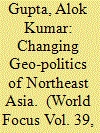

|
|
|
|
|
| Summary/Abstract |
The geopolitical landscape of Northeast Asia is changing owing to shifting strategic and political dynamics on the Korean peninsula. Hectic diplomacy is happening involving directly South Korea, North Korea and United States and indirectly China and Russia. South Korean President Moon Jae-In is as dynamic and forward looking as Indian Prime Minister Narendra Modi.
|
|
|
|
|
|
|
|
|
|
|
|
|
|
|
|
| 3 |
ID:
137441
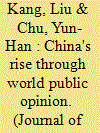

|
|
|
|
|
| Summary/Abstract |
Measuring the perception and attitudes of the world's public toward China has gained new momentum in recent years. In 2009, Shanghai Jiao Tong University's Institute of Arts and Humanities for the first time inaugurated a China-based National Image Survey Project, including a US survey (2010) and 12 Asian countries and regions (2011–2012). Authors in this special issue engage in interpretations and analysis of the data, and one of the most significant lessons is that public opinion, attitudes and perceptions of China's rise are the outcome of dynamic interactions and an assemblage of factors, a synergy of material interests, ideational and emotional reactions, and values, ideologies and principles, unraveling themselves against a highly volatile, precarious and contentious geopolitical backdrop, in which the interests of nation-states and individuals have become intertwined and inseparable.
|
|
|
|
|
|
|
|
|
|
|
|
|
|
|
|
| 4 |
ID:
182611
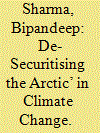

|
|
|
|
|
| Summary/Abstract |
The rapidly transforming Arctic has led to rethink the concept of security in the region. The increasing global warming and opening up of the Arctic have brought multiple geopolitical issues before the Arctic and non-Arctic states.1 In pursuit of their perceived geopolitical, geo-economics and strategic interests, a race to ‘securitise the Arctic’ has started amongst the major Arctic states. This process of securitisation appears to be dictated and driven not only by traditional military-strategic considerations but also by non-traditional security threat dilemmas related to energy, environment, sustainability, human security, connectivity, etc. As the old and the new Arctic challenges are being taken out of the realm of ‘normal politics’ and placed in the contested domain of ‘security politics’, the Asian states, that are directly or indirectly impacted by the changing Arctic realise that securitisation of the Arctic is leaving little space for addressing common issues of global concern. This study argues that all these emerging issues (otherwise perceived as ‘security threats’) in the Arctic, instead of being addressed in the securitisation framework, could and should be approached and addressed as compelling reasons for mutual cooperation and thus in need of de-securitisation.
|
|
|
|
|
|
|
|
|
|
|
|
|
|
|
|
| 5 |
ID:
193238
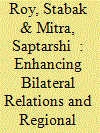

|
|
|
|
|
| Summary/Abstract |
The primary objective of this study is to assess the practicality and consequences of establishing railway connectivity between India and Myanmar. By exploring the possible impact of this initiative on the relationship between the two countries and regional collaboration, this study aims to shed light on its potential benefits and challenges. The railway network aims to enhance connectivity between the Northeastern states of India and Myanmar, providing a new trade route with Southeast Asia. The study was based on policy review, meta-data analysis, bibliometric literature review and case studies using geospatial techniques. The results indicate that the proposed railway connectivity has the potential to boost trade, tourism and investment and strengthen regional cooperation. However, significant challenges such as security concerns, financial viability and political stability need to be addressed to realise the potential of railway connectivity fully. The study concludes that strong political will, effective project management and public–private partnerships are crucial for the success of the India–Myanmar railway connectivity and its potential impact on bilateral relations and regional cooperation.
|
|
|
|
|
|
|
|
|
|
|
|
|
|
|
|
| 6 |
ID:
187970
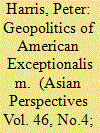

|
|
|
|
|
| Summary/Abstract |
Leaders inside the United States have long tried to maintain favorable external conditions, especially in Eurasia, to protect or advance their domestic agendas. In recent decades, this connection between domestic politics and geopolitical conditions in the “Old World” has incentivized US leaders to pursue a pattern of never-ending military interventions. In turn, the material reality of perpetual engagement in Eurasian affairs has given rise to the pervasive idea that the United States is and must remain an indispensable guarantor of international order. However, these contemporary ideas of American Exceptionalism are dangerously mismatched with the emerging reality of a multipolar world system in which the United States has fewer opportunities to militarily intervene across Eurasia without risking significant repercussions.
|
|
|
|
|
|
|
|
|
|
|
|
|
|
|
|
| 7 |
ID:
154028


|
|
|
|
|
| Summary/Abstract |
The British decision to quit India brought forth an essential question on the status of the princely states and their relationship with India and Pakistan. The British Cabinet Mission in 1946 however had declared that Britain’s paramountcy over the princely states would not be transferred to the successor government(s) but would simply lapse, meaning, rights that had been surrendered by Indian princes to the paramount power “will return to the states” ( Menon 1955:47).
|
|
|
|
|
|
|
|
|
|
|
|
|
|
|
|
| 8 |
ID:
096019
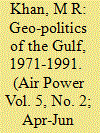

|
|
|
| 9 |
ID:
093340
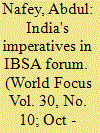

|
|
|
| 10 |
ID:
142263
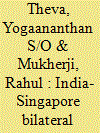

|
|
|
|
|
| Summary/Abstract |
This paper is a critical historical analysis of the trajectory of geo-political and economic relations between India and Singapore. This paper argues that India’s perception of its interests and its geopolitical orientation towards the Cold War prevented India’s security and economic integration with Southeast Asia. Apart from geopolitics, the economic orientation of India was also a critical factor that influenced the trajectory of India – Singapore economic engagement. However, there was a dramatic change after the Cold War ended. The structural change from bi-polarity towards a unipolar moment transformed both geopolitics and economic engagement. Moreover, India’s own economic orientation had also changed by the end of the Cold War. In sum, this paper attempts to elucidate upon how ideas construct economic and political interests and how geopolitical interests, once constructed, drive economic relations.
|
|
|
|
|
|
|
|
|
|
|
|
|
|
|
|
| 11 |
ID:
168092
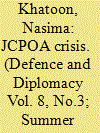

|
|
|
| 12 |
ID:
147979
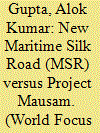

|
|
|
|
|
| Summary/Abstract |
Alfred Thayer Mahan in his book The Influence of Sea Power upon History 1660-1783 most famously presented his concept of ‘sea power’ which was based on the idea that countries with greater naval power will have greater worldwide impact. His concept had an enormous influence in shaping the strategic thought of navies across the world, especially those of United States, Germany, Japan and Great Britain. His concept ultimately led to European naval arms race in the 1890s. It was indeed a revolutionary analysis of the importance of naval power as a factor in the rise of the British Empire. Mahan’s argument that British control over the seas, combined with a corresponding decline in the naval strength of its major European rivals paved the way for Great Britain’s emergence as the world’s dominant military, political and economic power.
|
|
|
|
|
|
|
|
|
|
|
|
|
|
|
|
| 13 |
ID:
093984
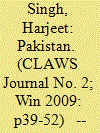

|
|
|
| 14 |
ID:
172560
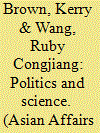

|
|
|
|
|
| Summary/Abstract |
The Coronavirus (2019-nCoV, or COVID-19) outbreak started in the central Hubei province in China. The spread of the disease across China, and now around the globe, is a multi-layered issue that affects both politics and science. On one level, it is a public health crisis in an area where developing China is particularly vulnerable. On another, it sheds light on the issue of governance under Xi Jinping and the strengths and weaknesses of his highly centralised style of rule in contemporary China. Finally, it also speaks to the current atmosphere in geopolitics, where the boundary between China and the world around it, and particularly with the USA, is growing deeper. This article will look at each of these issues in turn. The spread and global impact of the virus has proved to be a fast-moving phenomenon. It is likely to make an impact that will last not just for years, but decades. There is every possibility that globalisation will be recast and reformed, as a result. This is a very initial attempt to understand some of the factors that might go into this, as they can be seen at the time of writing (April 2020).
|
|
|
|
|
|
|
|
|
|
|
|
|
|
|
|
|
|
|
|
|